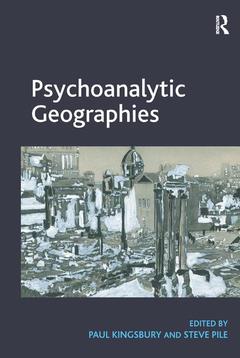Preface, Paul Kingsbury and Steve Pile; Introduction: the unconscious, transference, drives, repetition and other things tied to geography, Paul Kingsbury and Steve Pile. Part I Histories and Practices: Freud in the field: psychoanalysis, fieldwork and geographical imaginations in interwar Cambridge, Laura Cameron and John Forrester; On Freud's geographies, Liz Bondi; Consulting rooms: notes towards a historical geography of the psychoanalytic setting, Felicity Callard; 'Worlding' psychoanalytic insights: unpicking R.D. Laing's geographies, Cheryl McGeachan; Mapping trauma: topography to topology, Virginia L. Blum and Anna J. Secor. Part II Psychic Life and its Spaces: Geographies of psychic life, Joyce Davidson and Hester Parr; A distributed unconscious: The Hangover, what happens in Vegas and whether it stays there or not, Steve Pile; 'Or does it explode?' Psychoanalytic geographies of violence and creativity in a small Mexican city, Karen Rodriguez; 'Tehrangeles', CA: the aesthetics of shame, Nazanin Naraghi; Psychoanalysis and the geography of the Anthropocene: fantasy, oil addiction and the politics of global warming, Stephen Healy. Part III The Technologies of Becoming a Subject: When 1+1 does not equal 2: childhood sexuality and Laplanche's enigmatic signifier, Mary E. Thomas; Towards a psychoanalytic geopolitics: the militarization of public schooling in the USA, Ian G.R. Shaw, Jared Powell and Jessica De La Ossa; 'Welcome home our military sisters': sexual difference and female veterans with PTSD, Deborah Thien; Periscope down! Charting masculine sexuation in submarine films, Jesse Proudfoot and Paul Kingsbury. Part IV Social Life and its Discontents: 'Race', imperializing geographies of the machine, and psychoanalysis, Heidi J. Nast; A small narrow space: postcolonial territorialization and the libidinal economy, Maureen Sioh; The uncanny in the beauty salon, Elizabeth R. Straughan; What does it mean for young women to get drunk? A Kleinian perspective on young women's relationship with alcohol, Melissa Stepney; Gender, sexuality, and race in the Lacanian mirror: urinary segregation and the bodily ego, Sheila L. Cavanagh. Index.





